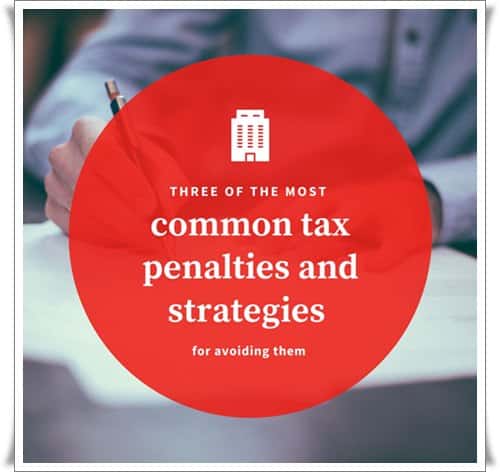
Nobody goes out looking for ways to pay the IRS more in taxes. But because of accidental errors, a lot of people can actually wind up doing it. The IRS levies several tax penalties for relatively typical mistakes. These blunders can be avoided by being aware of and following the tax requirements, including deadlines.
When it comes to completing your federal income tax returns and sending them in by the due date, things don’t always go as planned. Despite your best efforts, you still run the risk of being hit with an IRS late tax penalty if you underpay your quarterly installments, neglect to file your taxes, or bounce an IRS check.
Even if mistakes do happen, it might be helpful to be aware of the fines the IRS imposes and how they’re calculated. Furthermore, you can prevent tax fines by using this knowledge. But keeping track of all tax dates and having a clear understanding of your tax liability are the greatest ways to avoid IRS tax penalties. Utilizing cutting-edge tax solutions like FlyFin, which was created expressly to meet the requirements of independent contractors, 1099 employees, gig workers, and freelancers, will help you accomplish this.
If you got an IRS fine, best to know all the rules and your choices. Three frequent tax fines are listed by the IRS along with instructions on how to avoid them.
Missing a filing deadline:
April 18, 2022, is the last day to file your taxes for this year. The IRS gave you an option to file all the way up till October 15 to file your return, provided you applied for an extension before April 18. The problem comes in when you fail to file for an extension, then the IRs will start the process of computing your late filing penalty.
Every full or partial month your return is late will result in a 5% penalty of the unpaid tax being assessed against you. 25% of your total debt is the maximum you can borrow. A minimum penalty will be imposed if your return is delayed by more than 60 days. For returns filed after January 1, 2020, the minimum penalty is $435 or, in the event of a lesser amount, 100% of the tax owed.
If you think you’ll get a return, you have a little more leeway. In order to avoid penalties for missing the deadline and not filing your return, if you are unable to pay the balance due. If your claim isn’t submitted within three years of the actual deadline, you face the risk of losing your refund.
Penalties for home office deduction
You can easily deduct the cost of your home office if you operate a home childcare business, put up an office in a room of your house, or set up a closet or other area to store products. The trick is to always work from home and never go anywhere else for business. If your office serves as a guest bedroom as well, you can only deduct the portion of the space that is used for work. The IRS’s decision to rule the taxpayer ineligible for the home office tax deduction might have far-reaching effects.
Sometime you are unable to pay:
There could be conditions where you might, but the IRS thinks that if you are able to earn that income you should be able to pay the tax and therefore it’s best to pay in on time. Unfortunately, not paying will directly attract a pay penalty on you.
This tax penalty, which has a maximum fine of 25% of the tax payable, is equivalent to 0.5% of the tax due per month. Let’s say that you are selected for a payment plan on time, then the IRS will give you extra breathing space and reduce your late tax penalty to 0.25 percent of the tax.
Just to be clear, penalties mount at the start of every month and are counted monthwise. So if you paid at the start of the month you’ll still pay for the entire month – so it’s wise to make the payment as soon as possible.
Even if you ask for a tax extension, make sure to pay your taxes in full by the due date to avoid or at least minimize penalties.
If you owe a lot more than you have, start by paying the little amount you can and get the remaining tax amount to the IRS when you arrange the rest. Switch an installment tax payment plan if you need more time.
Conclusion
The greatest strategy is to stay away from fines at all costs. Every now and then, the IRS grants those who have already received tax penalties relief. As previously said, these are the three tax penalties that are most frequently encountered and how to avoid them. You can compare 1099 vs. W2 to determine how much more probable a 1099 employee is to face a tax penalty than a W2 employee.
Leave a Reply
You must be logged in to post a comment.